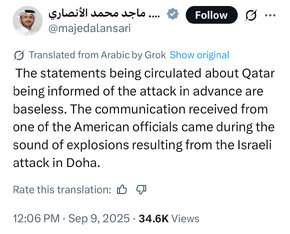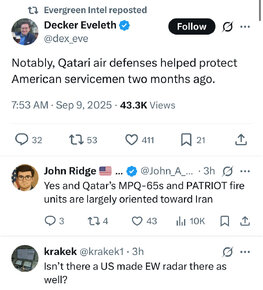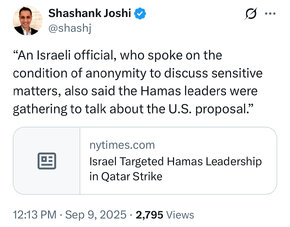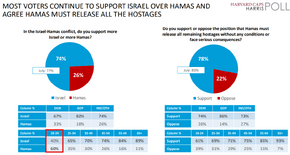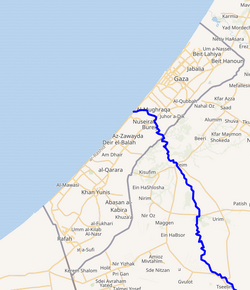Big_Zucchini
Well-Known Member
If civilians refuse to evacuate and that information was verifiable, then Israel would most likely refrain from targeting it. We can see that one building was destroyed an hour after a warning was issued, and another a full 24 hours later.Interesting. Would it be your assertion that if a high-rise residential building housing many Palestinian civilians in Gaza, who stubbornly refused to leave, would still be standing right now, with no evidence of Hamas activity, then Israel would refrain from targeting it, even if the presence of civilians ran contrary to Israeli political objectives?
If civilians had evacuated and the IDF was left with the dilemma of what to do with an empty building, then regardless of whether Hamas had set up inside, it is possible that the building would be struck. It is not an assertion that it would be struck, which is what you inferred earlier. It is my personal assessment.
A high rise building:
- Provides a clear military advantage if used later by Hamas.
- May be more difficult to evacuate again later if CAS is requested by ground units on a threat inside or on the building.
- Leaves ample room to suspect hard-to-verify infrastructure and activities such as tunnel shafts, explosive-laden walls/structures, weapons caches and other IEDs and equipment.
In a ground maneuver into Gaza City, which has already begun, high rise buildings must go. That's a hard reality of urban warfare. You remove everything high level.
The issue of civilian evacuation does not affect whether a high rise building is struck. It most likely only affects whether that decision is made sooner, or deferred to a later point in time.
Given that evacuating civilians is the highest priority and an enabler for a ground maneuver, I assessed that the time to do it is sooner rather than later.
My comment referred solely to the timing.You said that there was Hamas infrastructure there. But at no point did you say that it was the reason why they struck the building. Instead, read in sequence, your posts seem to state that the reason for strike was "to reduce living space in Gaza City to make it a worse QoL alternative to Mawasi
The standard strike procedure is neither an excuse nor bullshit. It is the baseline for every strike. Then military strategy affects how to handle the target bank. It is an additive element.and the excuse, fig leaf, bullshit reason provided to the world was "That building was likely in the target bank, meaning it was likely incriminated beforehand with intel of usage by Hamas". You either failed to understand what I'm saying or intentionally ignored it. I'm asking, what was the motivation for the strike? What was the reason?
The reasons are multiple. Explained in comments above. To summarize, speculation:
Reasons:
- Deny military advantage.
- Deny strategy.
- Ground operations are ongoing.
- To assist in evacuation order.
- To pressure for deal.
Numerous buildings were struck. I am aware of footage coming from at least one of them, via Hamas's media channels. I am not aware of combatants being inside at the moment of strike or beforehand.Ok, not re-read your original post. Anything in there about Hamas operatives? Anything in there about it being filled with enemy combatants? How do you not understand why I asked what I asked?
Nor should there be. The standard strike procedure is to be assumed. If you have any question about how the IDF operates, feel free to ask. But I realize that sometimes I write walls of text so I assumed making a shorter, simpler post would suffice. I was unaware that the standard procedure was unknown to you.You explained in a follow-on post what would in principle provide justification. My reply was to the original post where no such information was contained.
You start by making an assertion, and only proceed with questions you do not expect to be answered, but if you'd known the answer to them before the assertion, you wouldn't make it.1. Again, what is the reason for the strike? 2. How is the target bank generated? 3. Was in there in fact intel at the time of the strike that the target building was being used by Hamas? 4. Consider your original claim and current, feverish backpedaling. 5. You're seemingly willing to admin that Israel's intent is to destroy civilian housing in order to remove civilian population, but rapidly back away from that when challenged.
1. The reasons for the strike are multiple. See answers above.
2. The target bank is generated via intelligence. I don't know how much you know about military intelligence, but there are hundreds, if not thousands of sources of information and methods that could feed a target bank. Sometimes it's visual, sometimes it's a wiretap, sometimes it's special means. My service revolved around those special means.
Sometimes from a local maneuvering unit, sometimes artillery, and sometimes from an air force wing. The possibilities are endless.
When intelligence is sufficient to create a full picture, you have a target ready to execute in the bank. Depending on target, some intelligence will have to be periodically refreshed. If you're striking a soft moving target or a populated area, you may also need real time surveillance. Other targets may require that for BDA.
Then you move onto execution. Specialists from multiple disciplines weigh in on a per need basis, to determine the complete strike profile. What munitions are used, at what speed they're dropped, from what angle, and so on.
3. It is highly likely there was real time intelligence on the building at the time of the strike.
4. I did not backpedal. I elaborated. Why you ask questions with such aggressive tone is your issue, not mine. Are you taking offense in me taking the time to answer your questions?
5. It seems like I backed away because I never said such thing. But if you read carefully my previous comments you will understand.
You aggressively imply that the buildings were struck solely to force civilians out and for no other legitimate military advantage. Since I made no such claim for you to pick at, I can assume you are making that claim."But if destroying civilians housing is the target, not because of Hamas forces at that point in time operating out of there, but to force civilians out, that's an entirely different story."
Do you disagree with that being a different story? If so, fine, we can disagree... I guess.... somehow.... but where do you find a claim in what you quoted?
Can you prove that the strikes did not achieve military advantage and that they did not follow the standard strike procedure?


